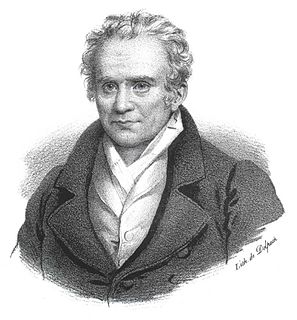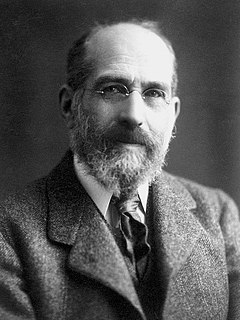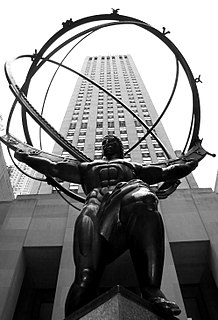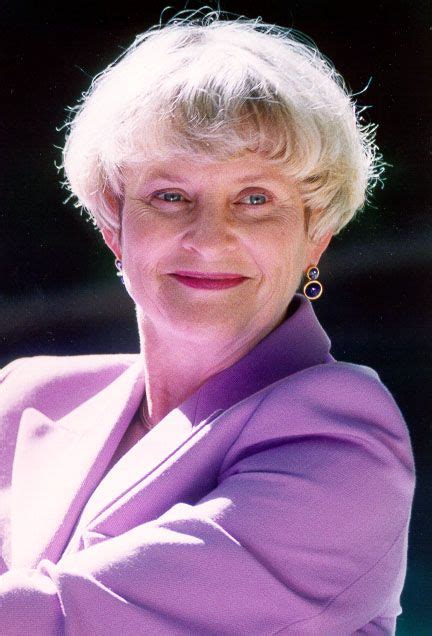Top 325 Rigorous Quotes & Sayings - Page 6
Explore popular Rigorous quotes.
Last updated on April 19, 2025.
The values of science and the values of democracy are concordant, in many cases indistinguishable. Science and democracy began - in their civilized incarnations - in the same time and place, Greece in the seventh and sixth centuries B.C. . . . Science thrives on, indeed requires, the free exchange of ideas; its values are antithetical to secrecy. Science holds to no special vantage points or privileged positions. Both science and democracy encourage unconventional opinions and vigorous debate. Both demand adequate reason, coherent argument, rigorous standards of evidence and honesty.
There was danger at times that women might not be judged by the highest standards, but more leniently because of their sex. "She is a remarkably good chemist--for a woman," you might hear a man say. It seemed to me essential, if the ablest young women scholars were to achieve the best work of which they were capable, that they should be held to the most rigorous standards. ...To advance, a woman must do at least as good work as her male colleagues, usually better.
Descriptive geometry has two objects: the first is to establish methods to represent on drawing paper which has only two dimensions,-namely, length and width,-all solids of nature which have three dimensions,-length, width, and depth,-provided, however, that these solids are capable of rigorous definition.
The second object is to furnish means to recognize accordingly an exact description of the forms of solids and to derive thereby all truths which result from their forms and their respective positions.
Thousands of Americans, Englishmen and Frenchmen have visited Germany during the months after the national revolution and were able to testify as eye-witnesses that there is no country in the world where law and order are better maintained than in present-day Germany. That there is no country in the world where person and property are held in better respect than in our own, but that there is perhaps also no country in the word where a more rigorous fight is put up against those who believe that they are free to let loose their lower instincts to the detriment of their fellow-beings.
One of the principal obstacles to the rapid diffusion of a new idea lies in the difficulty of finding suitable expression to convey its essential point to other minds. Words may have to be strained into a new sense, and scientific controversies constantly resolve themselves into differences about the meaning of words. On the other hand, a happy nomenclature has sometimes been more powerful than rigorous logic in allowing a new train of thought to be quickly and generally accepted.
When I'm editing, I tend to cut, go back over it, cut, go back over it, cut, so by the time I'm done, even with a cut, I don't have a rough cut and then work on it so much. I have a pretty rigorous cut of the movie that's usually in the range of what the final movie is going to be. It doesn't mean I don't work on it a lot after that, but I get it into a shape so I feel I can really tell what it needs, or at least it's ready to show people.
In college, in the early 1950s, I began to learn a little about how science works, the secrets of its great success, how rigorous the standards of evidence must be if we are really to know something is true, how many false starts and dead ends have plagued human thinking, how our biases can colour our interpretation of evidence, and how often belief systems widely held and supported by the political, religious and academic hierarchies turn out to be not just slightly in error, but grotesquely wrong.
We do have to learn poetry at school. Poetry is interesting to me, particularly Chinese poetry. It's like an ancient form of song. There's five sentences, seven sentences - they're very different from English poetry. Chinese poetry is much more rigorous. You can only use this many words, and they will form some kind of rhythm so people can actually sing it. To me, poetry is quite abstract but also quite beautiful.
A famous bon mot asserts that opinions are like arse-holes, in that everyone has one. There is great wisdom in this... but I would add that opinions differ significantly from arse-holes, in that yours should be constantly and thoroughly examined.We must think critically, and not just about the ideas of others. Be hard on your beliefs. Take them out onto the verandah and beat them with a cricket bat.... Be intellectually rigorous. Identify your biases, your prejudices, your privilege.
It occurs to me to wonder: do I believe in any god, or even positively not believe, as James does? I believe in systems and methods. I believe in the beauties of philosophy and poetry. I believe that the work we do and leave behind us is our afterlife; and I believe that history lies, but sometimes so well that I can't bring myself to resent it. I believe that truth is beauty, but not, I'm afraid, the reverse. It doesn't seem sufficient to sustain one in life's rigorous moments. Perhaps I shall embrace Islam. Its standards for poetry seem very high.
My upbringing was pretty interesting. It was a rigorous, intellectual upbringing, but with the idea that we were a part of an important and legitimate enterprise. What that meant was sitting around the dinner table from a really early age with people from all different backgrounds who believed in God. When I was reporting in the wake of September 11th in Iraq and elsewhere, I felt I had the capacity to talk to people whose beliefs might sound outlandish to more secular journalists. I felt like I could be a translator between those two worlds.
It doesn't matter if it's jazz or not. It's about how we listen, how we interact, how we guide our attention when we're listening, and how we can refine what we're doing musically. Also how we can create our own music, and what opportunities that can bring us, as creative musicians. And then insisting that musicians put themselves through an intellectually rigorous process, which involves a lot of reading and writing, while insisting that music scholars think about ethics.
To Epictetus, all external events are determined by fate, and are thus beyond our control, but we can accept whatever happens calmly and dispassionately. Individuals, however, are responsible for their own actions which they can examine and control through rigorous self-discipline. Suffering arises from trying to control what is uncontrollable, or from neglecting what is within our power. As part of the universal city that is the universe, human beings have a duty of care to all fellow humans. The person who followed these precepts would achieve happiness.
Now we will no longer concede so easily that anyone has the truth; the rigorous methods of inquiry have spread sufficient distrust and caution, so that we experience every man who represents opinions violently in word and deed as any enemy of our present culture, or at least as a backward person. And in fact, the fervor about having the truth counts very little today in relation to that other fervor, more gentle and silent, to be sure, for seeking the truth, a search that does not tire of learning afresh and testing anew.
Science is much more than a body of knowledge. It is a way of thinking. This is central to its success. Science invites us to let the facts in, even when they don't conform to our preconceptions. It counsels us to carry alternative hypotheses in our heads and see which ones best match the facts. It urges on us a fine balance between no-holds-barred openness to new ideas, however heretical, and the most rigorous skeptical scrutiny of everything - new ideas and established wisdom.
Religions, of course, have their own demanding intellectual traditions, as Jesuits and Talmudic scholars might attest.... But, in its less rigorous, popular forms, religion is about as intellectually challenging as the average self-help book. (Like personal development literature, mass market books about spirituality and religion celebrate emotionalism and denigrate reason. They elevate the "truths" of myths and parables over empiricism.) In its more authoritarian forms, religion punishes questioning and rewards gullibility. Faith is not a function of stupidity but a frequent cause of it.
The battle for self-discipline may leave you a bit bruised and battered but always a better person. Self-discipline is a rigorous process at best; too many of us want it to be effortless and painless. Should temporary setbacks afflict us, a very significant part of our struggle for self-discipline is the determination and the courage to try again....Eternal life in the kingdom of our Father is your goal, and self-discipline will surely be required if you are to achieve it.
What is the most rigorous law of our being? Growth. No smallest atom of our moral, mental, or physical structure can stand still a year. It grows--it must grow smaller or larger, better or worse--it cannot stand still. In other words, we change--and must change, constantly, and keep on changing as long as we live. What, then, is the true Gospel of consistency? Change. Who is the really consistent man? The man who changes. Since change is the law of his being, he cannot be consistent if he's stuck in a rut.
In this very uncertain time for the media, serious investigative reporting - the expensive, time-consuming stuff - is under enormous pressure at newspapers and other commercial news organizations. Non-profits such as the Center for Public Integrity are taking on this vital work and without them the prospects for investigative reporting would be even more dire. The Center has been properly celebrated for its careful, rigorous work, and to my mind it has now ascended to the status of national treasure.
The main challenge is technology and that's something I really push and work closely with Adidas on. They're real leaders in sports performance; always trying to push that further and further and get the best technology they can. That takes time and has rigorous testing, it's very laborious, but it's also very rewarding. You get to work with fantastic athletes, and that's a fantastic thing that has nothing to do with my day job in ready-to-wear.
I have found that the more I reflect philosophically on the attributes of God the more overwhelmed I become at his greatness and the more excited I become about Bible doctrine. Whereas easy appeals to mystery prematurely shut off reflection about God, rigorous and earnest effort to understand him is richly rewarded with deeper appreciation of who he is, more confidence in his reality and care, and a more intelligent and profound worship of his person.
Here is the tragedy of theology in its distilled essence: The employment of high-powered human intellect, of genius, of profoundly rigorous logical deduction—studying nothing. In the Middle Ages, the great minds capable of transforming the world did not study the world; and so, for most of a millennium, as human beings screamed in agony—decaying from starvation, eaten by leprosy and plague, dying in droves in their twenties—the men of the mind, who could have provided their earthly salvation, abandoned them for otherworldly fantasies.
If there is something in nature you don't understand, odds are it makes sense in a deeper way that is beyond your understanding. So there is a logic to natural things that is much superior to our own. Just as there is a dichotomy in law: 'innocent until proven guilty' as opposed to 'guilty until proven innocent', let me express my rule as follows: what Mother Nature does is rigorous until proven otherwise; what humans and science do is flawed until proven otherwise.
Eighty-three percent of our students are Pell Grant-eligible, which means, by and large, that their families have a dysfunctional relationship with wealth and with work. So if you have never been in an environment where you have come to understand the expectations of a career, because all you have ever seen is people be underemployed or unemployed, then how are you going to learn that? Our students are getting two forms of education. They're getting a rigorous liberal arts training, and they're also getting real world work experience.
Well into the 19th century there were pronouncements from just about every branch of science and medicine that reading, writing, and thinking were dangerous for women. Articles in the Lancet declared that women's brains would burst and their uteruses atrophy if they engaged in any form of rigorous thinking. The famous physician J.D. Kellogg insisted that novel reading was the greatest cause of uterine disease among young women and urged parents to protect their daughters from the dreaded consequences of print.






















